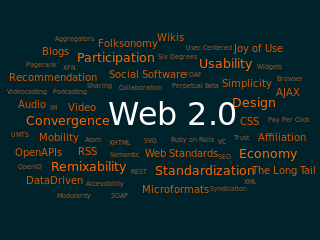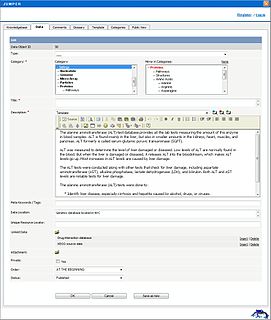Social software, also known as social apps, include communication and interactive tools often based on the Internet. Communication tools typically handle the capturing, storing and presentation of communication, usually written but increasingly including audio and video as well. Interactive tools handle mediated interactions between a pair or group of users. They focus on establishing and maintaining a connection among users, facilitating the mechanics of conversation and talk. Social software generally refers to software that makes collaborative behaviour, the organisation and moulding of communities, self-expression, social interaction and feedback possible for individuals. Another element of the existing definition of social software is that it allows for the structured mediation of opinion between people, in a centralized or self-regulating manner. The most improved area for social software is that Web 2.0 applications can all promote cooperation between people and the creation of online communities more than ever before.

Delicious was a social bookmarking web service for storing, sharing, and discovering web bookmarks. The site was founded by Joshua Schachter and Peter Gadjokov in 2003 and acquired by Yahoo in 2005. By the end of 2008, the service claimed more than 5.3 million users and 180 million unique bookmarked URLs. Yahoo sold Delicious to AVOS Systems in April 2011, and the site relaunched in a "back to beta" state on September 27 that year. In May 2014, AVOS sold the site to Science Inc. In January 2016 Delicious Media, a new alliance, reported it had assumed control of the service.
Furl was a free social bookmarking website that allowed members to store searchable copies of webpages and share them with others. Every member received 5 gigabytes of storage space. The site was founded by Mike Giles in 2003 and purchased by LookSmart in September 2004. Diigo bought it from LookSmart in exchange for equity.
Social bookmarking is an online service which allows users to add, annotate, edit, and share bookmarks of web documents. Many online bookmark management services have launched since 1996; Delicious, founded in 2003, popularized the terms "social bookmarking" and "tagging". Tagging is a significant feature of social bookmarking systems, allowing users to organize their bookmarks and develop shared vocabularies known as folksonomies.

Mixx was a user-driven social media web site that served to help users submit or find content by peers based on interest and location. It combined social networking and bookmarking with web syndication, blogging and personalization tools. As of December 6, 2011, the service was folded into Chime.in. Chime.in has since ceased services.
Social computing is an area of computer science that is concerned with the intersection of social behavior and computational systems. It is based on creating or recreating social conventions and social contexts through the use of software and technology. Thus, blogs, email, instant messaging, social network services, wikis, social bookmarking and other instances of what is often called social software illustrate ideas from social computing.

In information systems, a tag is a keyword or term assigned to a piece of information. This kind of metadata helps describe an item and allows it to be found again by browsing or searching. Tags are generally chosen informally and personally by the item's creator or by its viewer, depending on the system, although they may also be chosen from a controlled vocabulary.
Desktop organizer software applications are applications that automatically create useful organizational structures from desktop content from heterogeneous types of content including email, files, contacts, companies, RSS news feeds, photos, music and chat sessions. The organization is based on a combination of automated scanning of metadata similar to data mining and manual tagging of content. The metadata stored in applications is correlated based on a structure for the data type handled by the organizer tool. For example, the email address of a sender of an email allows the email to be filed in a virtual folder for the author and company the author works for or a music file is filed by the musician and album label. The resulting visualization simplifies use of desktop content to navigate, search, and use related information stored on the desktop computer. The data in desktop organizer tools is normally stored in a database rather than the computer's file system in order to produce virtual folders where the same item can appear in multiple folders to the user based on its relationship to the folder.
Connotea was a free online reference management service for scientists, researchers, and clinicians, created in December 2004 by Nature Publishing Group and discontinued in March 2013. It was one of a breed of social bookmarking tools, similar to CiteULike and del.icio.us, where users can save links to their favourite websites. ReadCube is a similar free service that offers storage, annotation and sharing tools specifically for scientific documents.

In the context of the World Wide Web, a bookmark is a Uniform Resource Identifier (URI) that is stored for later retrieval in any of various storage formats. All modern web browsers include bookmark features. Bookmarks are called favorites or Internet shortcuts in Internet Explorer, and by virtue of that browser's large market share, these terms have been synonymous with bookmark since the first browser war. Bookmarks are normally accessed through a menu in the user's web browser, and folders are commonly used for organization. In addition to bookmarking methods within most browsers, many external applications offer bookmark management.
Pageflakes was an Ajax-based startpage or personal web portal similar to Netvibes, My Yahoo!, Myhomepage, iGoogle, and Microsoft Live that operated from 2005 until January 2012. The site was organized into tabs, each tab containing user-selected modules called Flakes. Each Flake varied in content; information such as RSS/Atom feeds, Calendar, Notes, Web search, weather forecast, del.icio.us bookmarks, Flickr photos, social networking tools like Facebook, YouTube, Twitter, email and user-created modules. Pagecasts allowed users to share their pages publicly, allowing them to share a curated page of content that would be of interest to others .Pageflakes had 250,000 Flakes and over 130,000 Pagecasts.
Social search is a behavior of retrieving and searching on a social searching engine that mainly searches user-generated content such as news, videos and images related search queries on social media like Facebook, LinkedIn, Twitter, Instagram and Flickr. It is an enhanced version of web search that combines traditional algorithms. The idea behind social search is that instead of ranking search results purely based on semantic relevance between a query and the results, a social search system also takes into account social relationships between the results and the searcher. The social relationships could be in various forms. For example, in LinkedIn people search engine, the social relationships include social connections between searcher and each result, whether or not they are in the same industries, work for the same companies, belong the same social groups, and go the same schools, etc.
IBM Connections is a Web 2.0 enterprise social software application developed by IBM to provide online social networking tools for people associated with a company. The IBM collaboration suite, Notes / Domino, Sametime, Portal and Connections was sold to HCL technologies in December 2018.

Twine was an online, social web service for information storage, authoring and discovery, located at twine.com, that existed from 2007 to 2010. It was created and run by Radar Networks. The service was announced on October 19, 2007 and made open to the public on October 21, 2008. On March 11, 2010, Radar Networks was acquired by Evri Inc. along with Twine.com. On May 14, 2010, twine.com was shut down, becoming a redirect to evri.com.

ApexKB, is an open source script for collaborative search and knowledge management powered by a shared enterprise bookmarking engine that is a fork of KnowledgebasePublisher. It was publicly announced on 29 September 2008. A stable version of Jumper was publicly released under the GNU General Public License and made available on Sourceforge on 26 March 2009 as a free software download.
Enterprise bookmarking is a method for Enterprise 2.0 users to tag, organize, store, and search bookmarks of both web pages on the Internet and data resources stored in a distributed database or fileserver. This is done collectively and collaboratively in a process by which users add tag (metadata) and knowledge tags.
Folksonomy is the system in which users apply public tags to online items, typically to make those items easier for themselves or others to find later. Over time, this can give rise to a classification system based on those tags and how often they are applied or searched for, in contrast to a taxonomic classification designed by the owners of the content and specified when it is published. This practice is also known as collaborative tagging, social classification, social indexing, and social tagging. Folksonomy was originally "the result of personal free tagging of information [...] for one's own retrieval", but online sharing and interaction expanded it into collaborative forms. Social tagging is the application of tags in an open online environment where the tags of other users are available to others. Collaborative tagging is tagging performed by a group of users. This type of folksonomy is commonly used in cooperative and collaborative projects such as research, content repositories, and social bookmarking.
Elium, previously referred to as Knowledge Plaza, is a Software as a Service used for enterprise knowledge sharing within organisations. It supports use cases for knowledge management, social bookmarking, document management, wikis and internal social network. It was initially designed as an information management tool for knowledge workers and is often used for collaborative research projects, market intelligence, information brokerage, etc.

Tabbles is a relational file manager, running on Windows systems. The name "Tabbles" is portmanteau of tag and bubbles.







